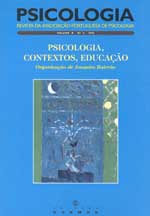Os computadores e o ensino. O Logo e a aprendizagem. Um balanço crítico
DOI:
https://doi.org/10.17575/rpsicol.v10i3.669Keywords:
-Abstract
In the present article we made an account of Logo’s application and research in educational settings, giving particular attention to works developed in Portugal. We also made a prospect of the role and interest of Logo language in the context of educational software. Firstly we give a general account of the number of schools and pupils envolved in educational programs using computers, from kindergarten to secondary school, and also of the two main paradigms in cognitive science – the classical cognitivism and the connectionism. Secondly, we try to analyze the relationship between educational practice and inquiry that envolved computers and the values which underly that particular human activity. Finally, we analyze the results of Logo’s research in the last few years and we mention the ideas and proposals of Papert and the MIT Learning and Epistemology Group, who modulate new ways of questioning and practicing in this particular field. The methodology employed in this study consisted of a descriptive analysis of documents produced in USA, in Portugal and other European countries, and an analysis of the results of an inquiry made to the coordinators of Minerva’s Project. This inquiry envolved questions on the use of New Technologies of Information (NTI) and Logo Portuguese schools and on research developed both by researchers and by teachers.


